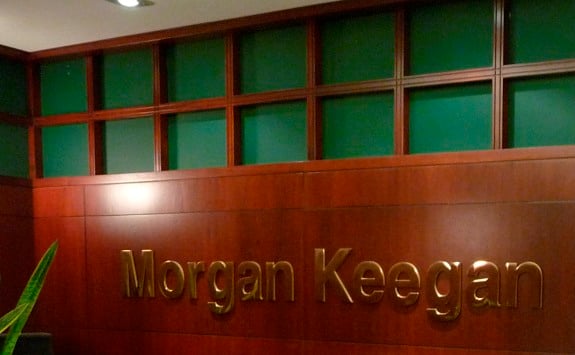In a bold move, the normally conservative Raymond James agreed to buy Morgan Keegan for $930 million. Now, the company will have to keep recruiters at bay while it tries to hold onto the brokerage's top talent.
Raymond James Financial Inc. has been known as one of the most conservative firms in the brokerage industry since its founding in 1962. Not anymore.
The $930 million acquisition of Morgan Keegan & Co. — announced yesterday — was anything but conservative. And observers say retention of top advisers will be crucial to the success, or failure, of the tie-up.
“This transaction is a little different from what Raymond James is known for,” chief executive Paul Reilly said this morning on a conference call with analysts. “But every 10 or 20 years, you find a unique opportunity.”
The price paid was not exactly conservative, either. RJ is paying $930 million for Morgan Keegan — a $230 million premium over book value of the firm. Keegan's parent, Regions Financial Corp., also will pay itself a $250 million dividend from the brokerage before the deal closes. RJ plans to finance the purchase with a $900 million bridge loan it will pay off with the proceeds from a $600 million bond offering and a $300 million sale of stock.
The deal solidifies Raymond James as one of the largest non-Wall Street firms in the industry and a bona fide powerhouse in the South. The combined firm will have more than 6,000 financial advisers with revenue of $4.2 billion and pretax income of $587 million. The purchase also beefs up RJ's capital markets business, making it the eighth-largest underwriter of municipal bonds in the country.
In addition, the deal introduces a whole new element of execution risk to a firm known for dependable growth in revenue and earnings. “The history of mergers in our industry has not been good,” admitted Mr. Reilly.
True to form, Raymond James has mapped out a conservative model for the combined companies, projecting no earnings accretion from Morgan Keegan this year, and just 2% to 3% next year. Mr. Reilly however, said those estimates are based on the dismal market environment. If the equity markets improve and the yield curve steepens, the upside from the transaction is “tremendous,” he said.
At 1.3 times tangible book value, Joel Jeffrey, an analyst with Keefe Bruyette & Woods Inc., said the price tag on the deal seemed reasonable. Regions Financial has agreed to retain the potential liability for $1.5 billion in losses suffered by investors in Morgan Keegan mutual and closed-end funds stuffed with mortgage-backed securities. Those funds collapsed when the financial crisis struck. Morgan Keegan paid $200 million to settle SEC charges last year and is still facing class actions stemming from those sales.
“If they hadn't gotten indemnification on the liability, I would have been more concerned,” Mr. Jeffrey said.
Raymond James' management is estimating that it will accrue cost synergies of between $50 million and $80 million from the deal. Mr. Reilly said the company is in no rush to realize those savings or to push Morgan Keegan advisers to a new operating platform too rapidly. “We'll get costs out deliberately," he said. "But we'll start with strengthening the platform and integrating people into the firm."
The key to the deal is getting Morgan Keegan advisers to buy into it. How they react to the merger over the next few weeks — and how many choose to leave — will largely determine whether the merger proves successful.
“If they're not relying on cost savings to justify the deal, they have to make sure they bring over the revenue generators,” said Mr. Jeffrey, who is maintaining his “market perform” rating on the company.
Moody's Investors Service is similarly concerned about the risk of defections. It cited the potential that financial advisers might flee as a reason for putting Raymond James on review for a possible credit-rating downgrade.
Recruiters, who have managed to move remarkably few Morgan Keegan advisers out of the firm since it was put up for sale, won't throw in the towel now. "The retention money [Raymond James] is offering the advisers looks significantly lower than what their competitors are offering," said Rick Peterson, a recruiter based in Houston, Tx, who has been in discussion with seven Morgan Keegan advisers. "If they offer 65% to 70% of production to the top producers, it will pale in comparison to what they can get in the market. Raymond James will have to make a compelling case to brokers on why they should join."
RJ has earmarked $215 million for retention purposes — a figure that “seemed a little low,” according to Mr. Jeffrey. However, Morgan Keegan has $200 million in retention money already in place, bringing the combined pool to about 50% of total revenue at Morgan Keegan, which seems more reasonable to Mr. Jeffrey. About $140 million of the new money will go to advisers, with the remainder allocated to capital markets and general management of the various businesses.
Raymond James chief financial officer Jeff Julien also indicated that there were purchase price adjustments built into the deal that would lower the cost if key revenue producers in the wealth management and capital markets businesses did not stay with the firm. He declined to provide additional details.
“The piranhas of the recruiting world are attacking from all directions. Our position is that we have to earn the affiliation of our financial advisers every day,” Tom James, son of the co-founder of Raymond James and current chairman of the board, said on the conference call. “Everyone will benefit from this merger but it will be a frenetic time of uncertainty and we'll have to do our best to deal with that.”
So will Morgan Keegan advisers.







